There’s no place for a black person in a white army.
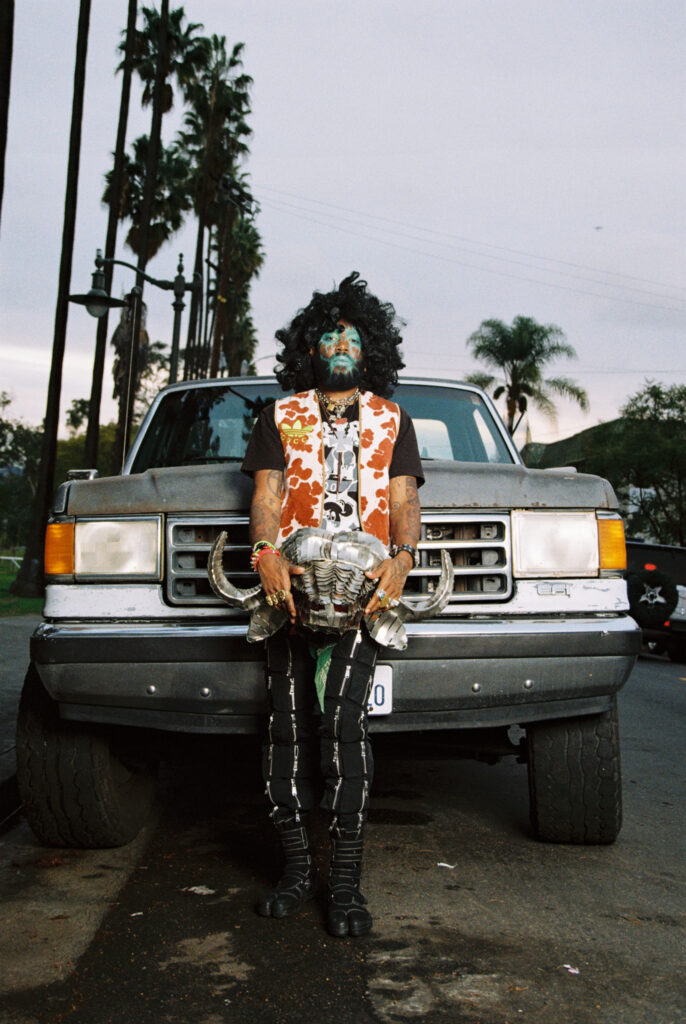
My mom was a single-parent soldier and had me very young. I was raised in Kanagawa, Japan, just outside of Tokyo. I remember seeing her experience a lot for the first time growing up, even though her main push in raising me was to get off the base. I was a kid, a lone wolf, just going around to shops and shows and clubs and meeting people. I stepped into performing under U-N-I-G-Y and kids from other bases and I would hit the city to do rap contests, opening up for American artists and things.
Japan did a lot of identity shaping when I didn’t even know it was taking place. I started to have a lot of Japanese friends and we’d run all over Tokyo wilding out – IN the culture, hanging out with whole crews and scenes, playing sports, having Japanese girlfriends and stuff… Not every kid from a base has these experiences. There also weren’t many colored people around, so sometimes there was a lot of interest in what I had to say.
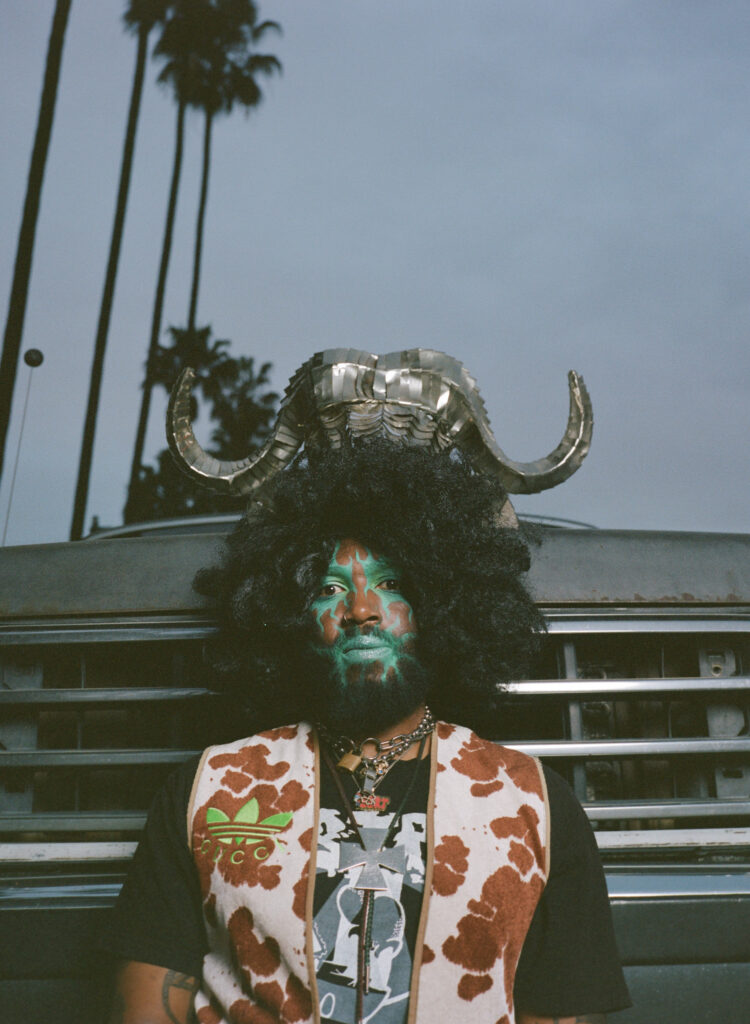
Coming to the United States was a complete culture shock. My friends and a lot of adults on base told me I should go to America after I graduated because I had the opportunity – the military dropped me off in Texas only because that’s where my mom signed up, with literally nothing but my backpack. Isn’t that crazy? It was so much for me. Nobody understood how I could look the way I do and say that I was culture-shocked.
My uncle is the one who first got me into music because he was signed to Alternative Tentacles. He was discovered by Jello Biafra in San Francisco and ran around with Dead Kennedys and all these punk bands… He was what they called a raptivist. He made hip-hop to us, but punk to everyone else with those antennas up. He was my hero and always will be, the first to show me how to do it all in music. Over time, as a growing artist, I needed to elevate. Taking from what he was doing in the 80s, lately, my releases haven’t been just beats and samples – it evolved into hitting the studio, spending a year plus of extra time stripping out the elements and inviting players in to narrate everything in one take.
I’m more comfortable having the risk on me.
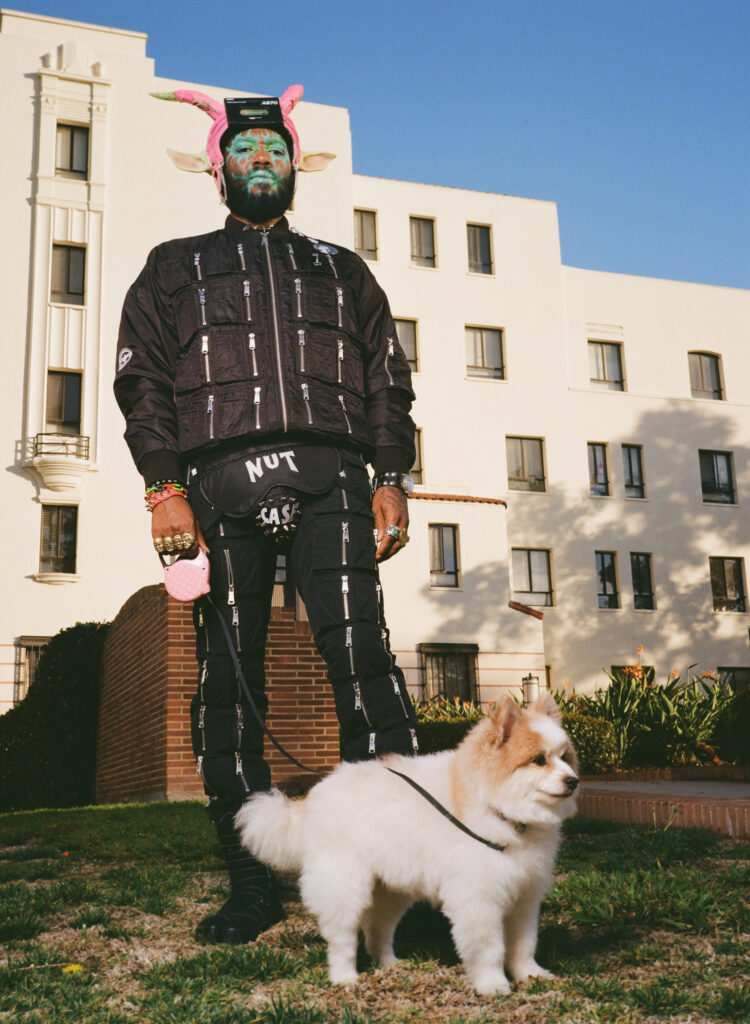
I started signing to labels in the US after moving to New York – there were labels in Japan, but they didn’t have much of an ear tuned to Western music. When you’re on a label and somebody else is handling your affairs, you never really get to see what’s going on. And if you’re making art, what’s the point of creating if you’re not linking up the pieces?
The labels decide if something has a certain level of accolade to tell you. Being signed is cool because it’s expensive being an artist. But taking the risk on yourself, the stakes are much higher and there’s much more intention behind everything.
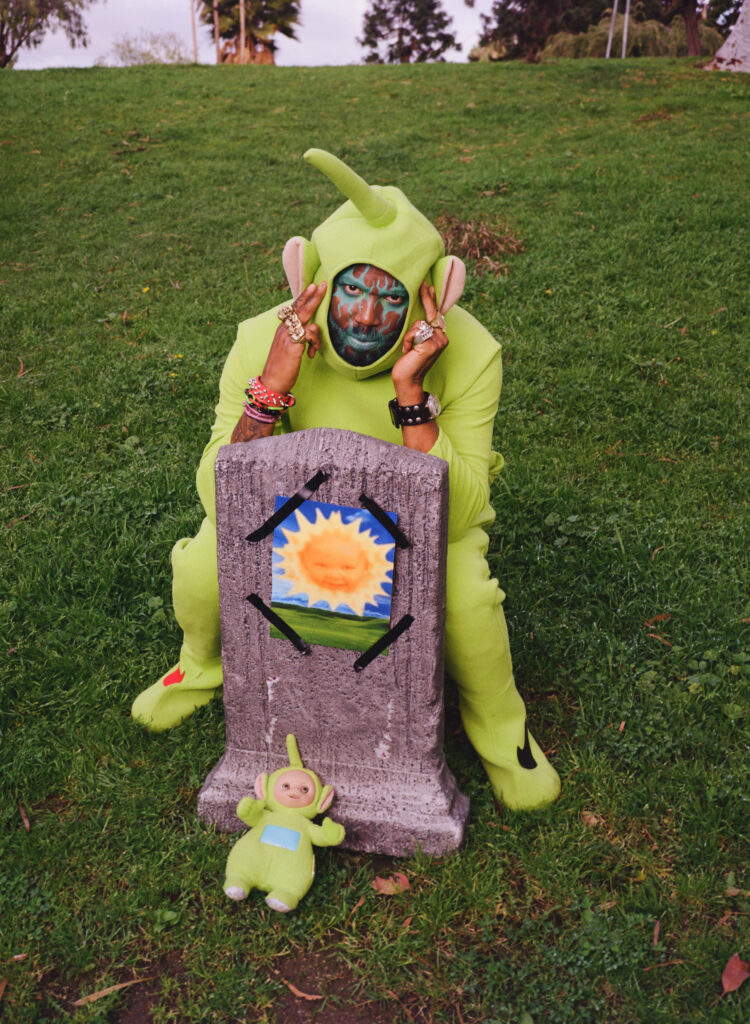
When I was signed to Ultra I wanted to take a break from music with all the racial tension I started experiencing. There was a fashion school on the same street as its headquarters and after finishing my degree, I decided I wanted to put a brand together. I filled up a suitcase of my makeshift kitchen sewing studio in Brooklyn and went to South Africa – some friends in Johannesburg had a stall and told me I could sell out of their store.
From the time I was there, I started getting all these opportunities for having something unique to showcase. I wound up getting asked by Red Bull Academy to be an artist in residency – that consisted of going out into town every night, finding out what artists/bands I like, and inviting ’em back to the studio the next day.

That had me out there for a while. I was also connecting with more people to make music with. One time I had a studio session for Sub Pop and Seun Kuti wound up walking in going, I like what I hear, what’s going on in here? <laugh>. I’m like, What, man? You Fela Kuti’s son, what the hell you talking about? <laugh>. But this fool was for real f*cking with us. He invited us over to another studio, come to find out he was working on one of those AIDS Awareness Foundation-type compilations that were coming out at the time. He asked us to do an official remake of a Fela Kuti song Zombies; Red Hot Riot was the original compilation name, came out on Knitting Factory Records. The one I’m on is called Red Hot + Fela. It had Questlove, My Morning Jacket, Chance the Rapper… All these huge people on TV and the radio, and me just sitting there like, Hell yeah yo! <laugh>. South Africa was on fire. After the Red Bull thing, I managed to land another artist residency, mostly for the clothes I was making.
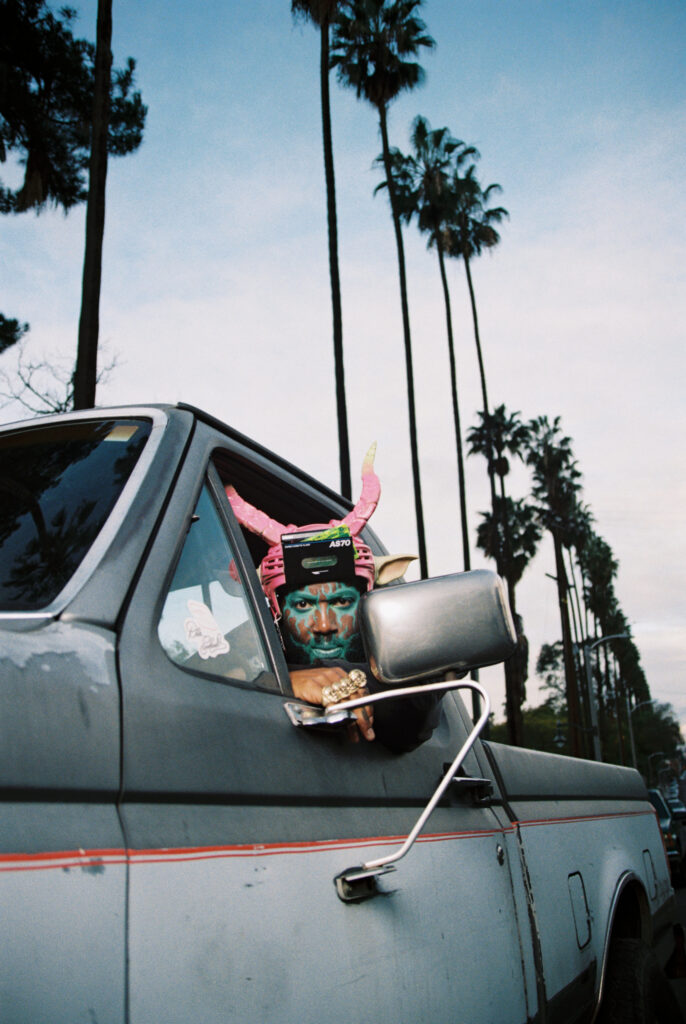
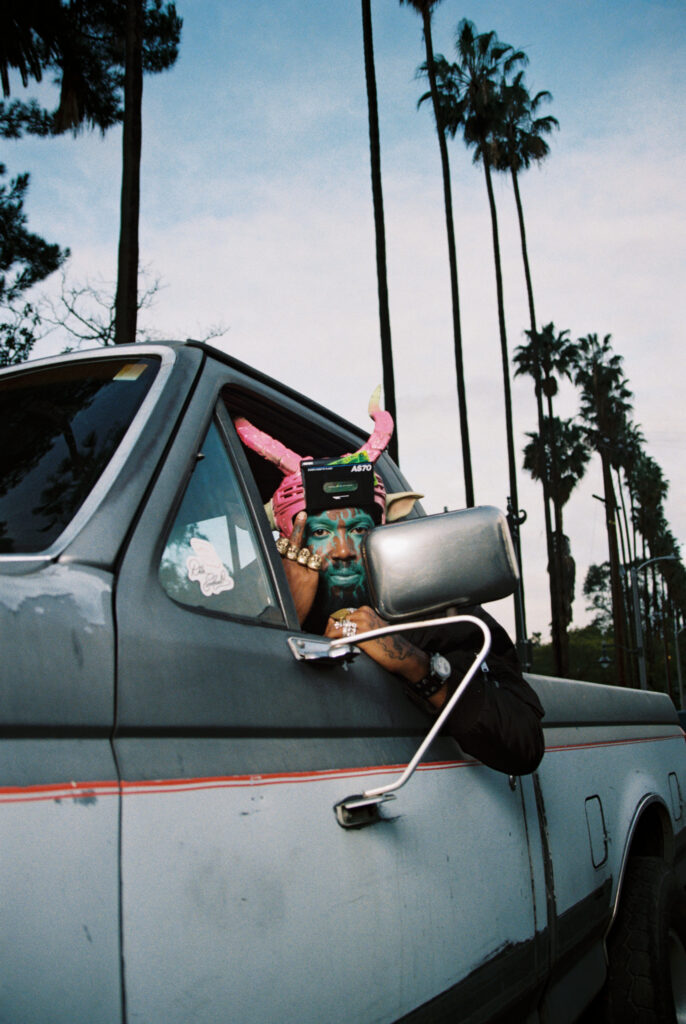
South Africa was also the first place I was asked to DJ. I didn’t get it <laugh>, I never spun records live before and never promoted myself as a disk jockey. My beautiful friends there sat me down and told me that in South Africa, when somebody asks you to spin, that just means they want to know what’s going on inside your mind. They just want to exchange energy and tap into your vibe. Nobody ever explained music like that to me. It was a proper spot and I played my homie’s tracks mixed with my own, which ended up being something I did consistently out there.
That time was very influential because having access to playing music and seeing how people moved to it changed how I approached making music. You’re able to see how the room works and when you’re back in the studio, you can hear what might be needed and remember what works.
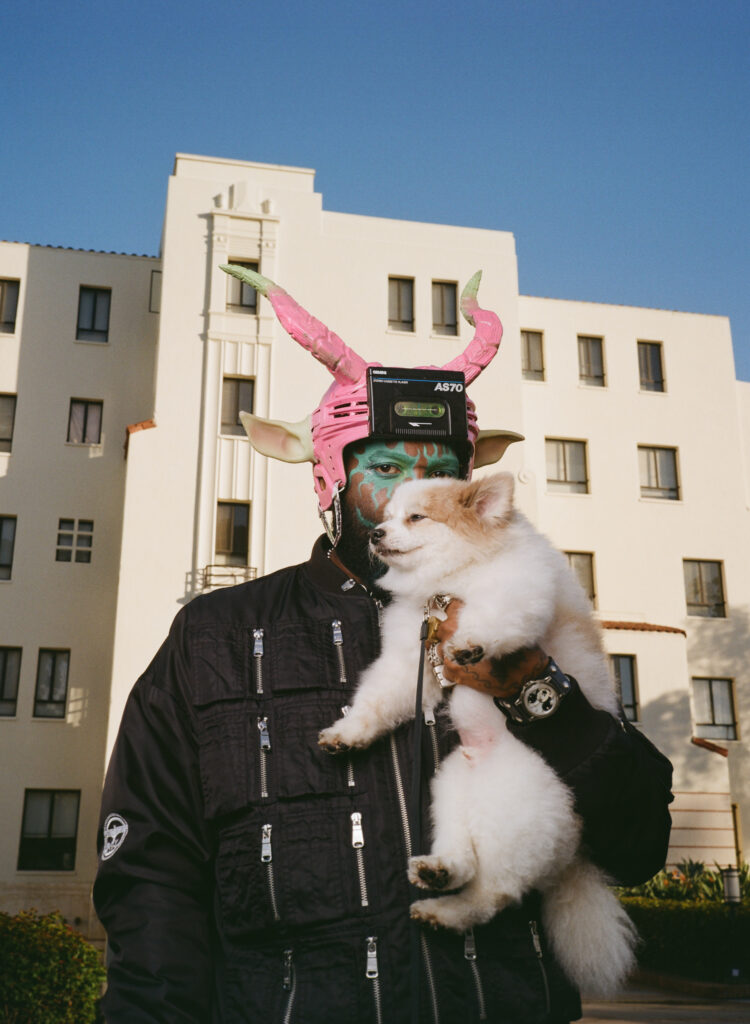
Over the last few years, I got heavily into my cassette jockey sh*t. I’ve been doing radio shows on Dub Lab and NTS; there’s a crew called Rap Vacation with custom machines built to play cassettes that you can scratch with spools. Cassette weeks, parties 6 nights out of 7, playing punk shows in the desert… I didn’t think anything of it until the whole idea started gaining motion.
But my first real success in music came from being at a f*cking boat party back in New York, when I met somebody that was in The Cranberries. I was making rave music, mostly acid house at the time, and he lined me up with some friends of his from Ireland who had been looking for a front person in the genre with an American accent…
A week later I got sent a record and wrote/recorded on top of it without even leaving my studio seat. I shot it back and after another week I got some calls from management at PIAS, wanting to give us a deal. We signed as ‘Bon Voyage.’ The only catch was they wanted to promote us the old-school way… How all the bands in the UK and Ireland had done it: Let’s make these motherf*ckers run laps around the island until their shows sell out <laugh>. So that’s what they did to us, they made us circle Ireland until we started selling everything out. It took years, but it happened. Now things are sweet, we’ll play festivals throughout the summer ’cause they got festival season. A few summers ago I toured rugby arenas with The Cure, and The Prodigy the summer next… It’s another life that people in LA don’t know I have <laugh>. Then I come back to switch up the pace for hockey time…
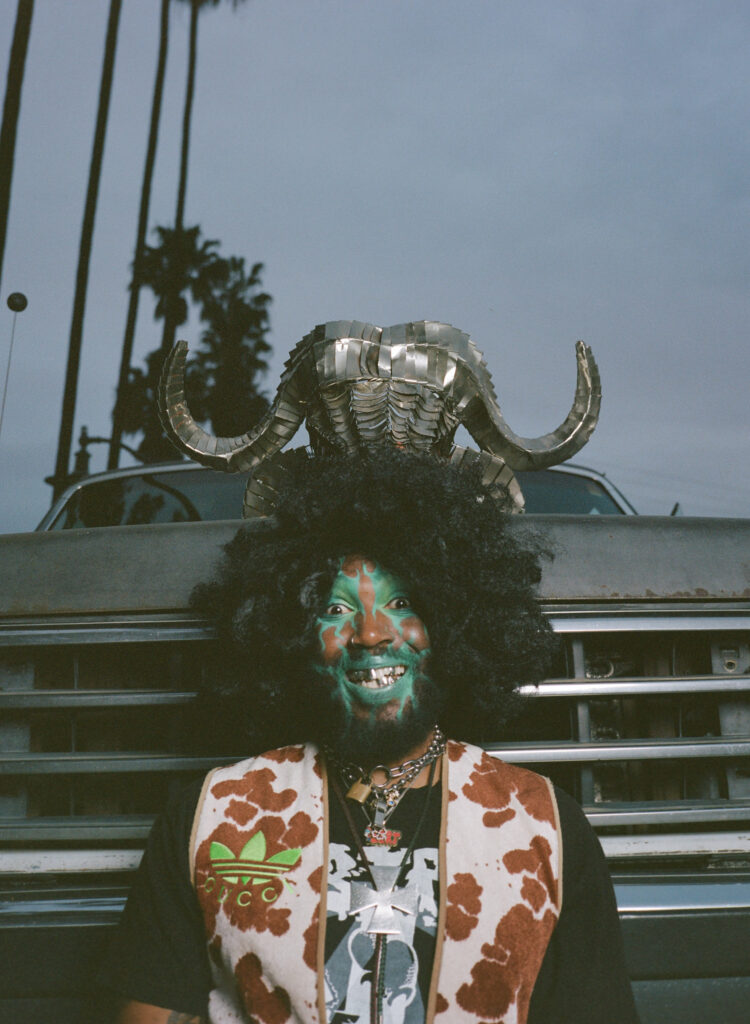
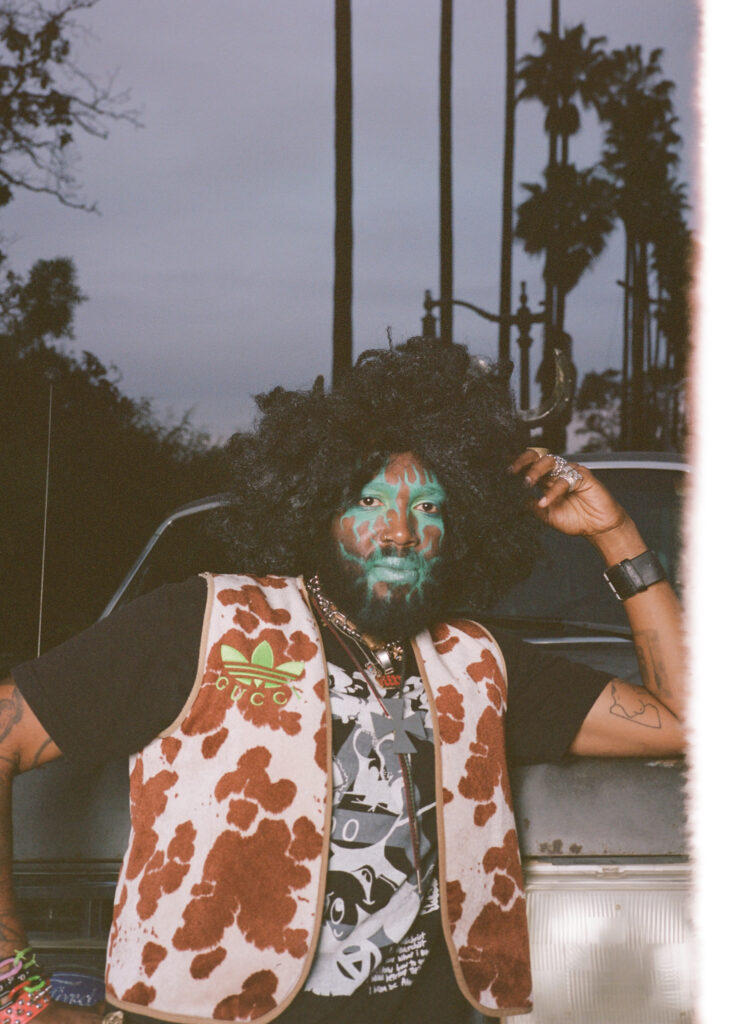
Fast forward to the Pandemic – I’m now in Los Angeles, and when things started opening up again, Surfbort was having their first show back. I asked Sean about being a mascot or something, like, what should I do? His response was, what should you do? You should open up the f*cking show. I didn’t even ask any questions because that’s something you learn in life, I’mma just get what you need bruh.
A punk show at the Lodge Room <laugh>, fresh off hip-hop & acid house tours… What was I gonna do? One of my best friends, DJ Sky, had put me onto her guitar-shredding little brother in a studio session a few months prior. So when that opportunity came, the first thing that came to my mind was him. I took the album I had just put out and we dissected it, sped it up, added a drummer and bass player, toughened it out.
That show was really what started all the band sh*t with my music, which is what I’m most known for here in LA. The backing group now goes by Zamboni Zound Zyztem. I think I needed another extension of my music because I had been feeling very misunderstood up until that point.
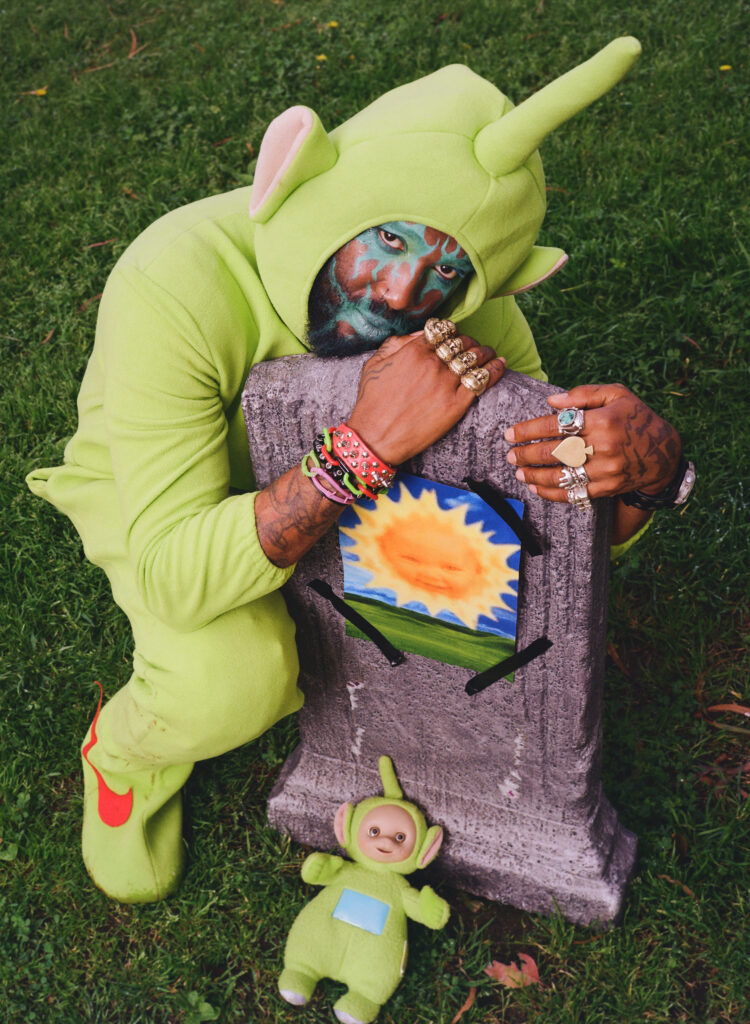
Mental health-wise, I had been running around for the majority of my life undiagnosed with a breadth of issues. How could you realize not everything’s supposed to feel a certain way when it’s all you know? In recent times it’s been really fruitful to create and connect with others being on meds for the first time, being more calm and understanding of things.
Coming from being agro my whole life, I needed my music to reflect that because my most successful and highly requested tracks up to that point had been happy and upbeat. But I’m not afraid of the dark, and I wasn’t raised with the wool pulled over my eyes – darkness was another chamber of music to explore, closer to my truth and upbringing, which has historically been difficult for people of color to be accepted for putting out.
With all this traveling, being a military brat to touring young, I never had the opportunity to be a part of a community. My community has always been a global circle of close friends and fans. Until I got to LA there’d been a sense of isolation through it all.
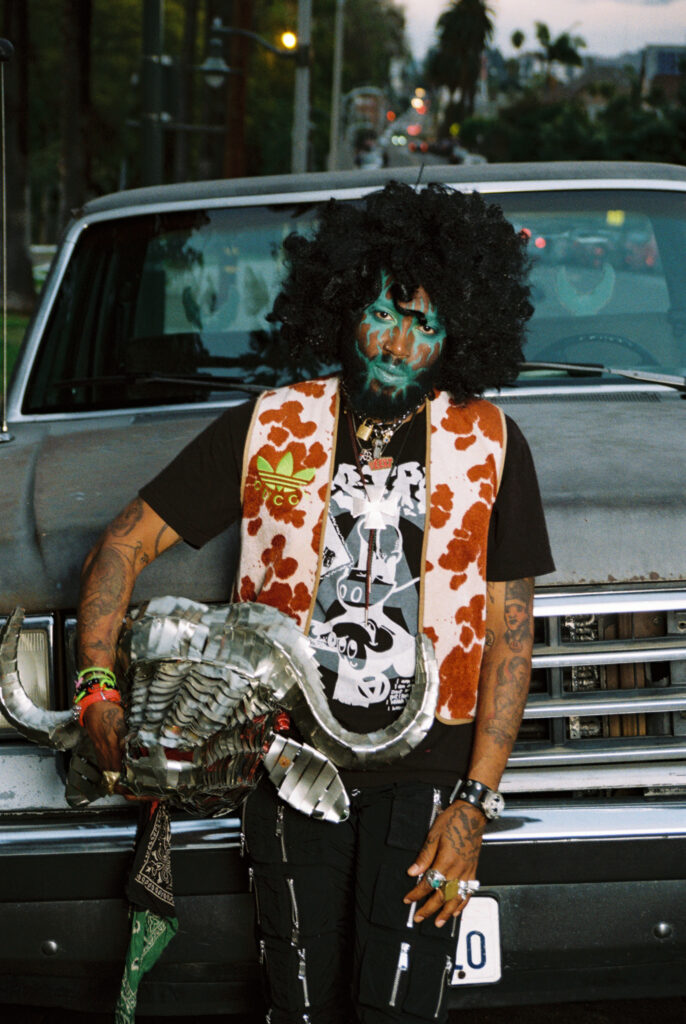
When I lived in New York, I could see the Statue of Liberty out of my window in Brooklyn. You know how many times I went to the Statue of Liberty? Not one single motherf*cking time <laugh>. And now I’m always going, Man, I wonder what it was like up there.
I feel the same way locally – people can think what each of us do here is dope, but since we’re all in LA, there’s a level of, I can check them any time. Hitting the road is so different because people have been waiting to see you. I love taking away and learning things from other places and patterns of thought.
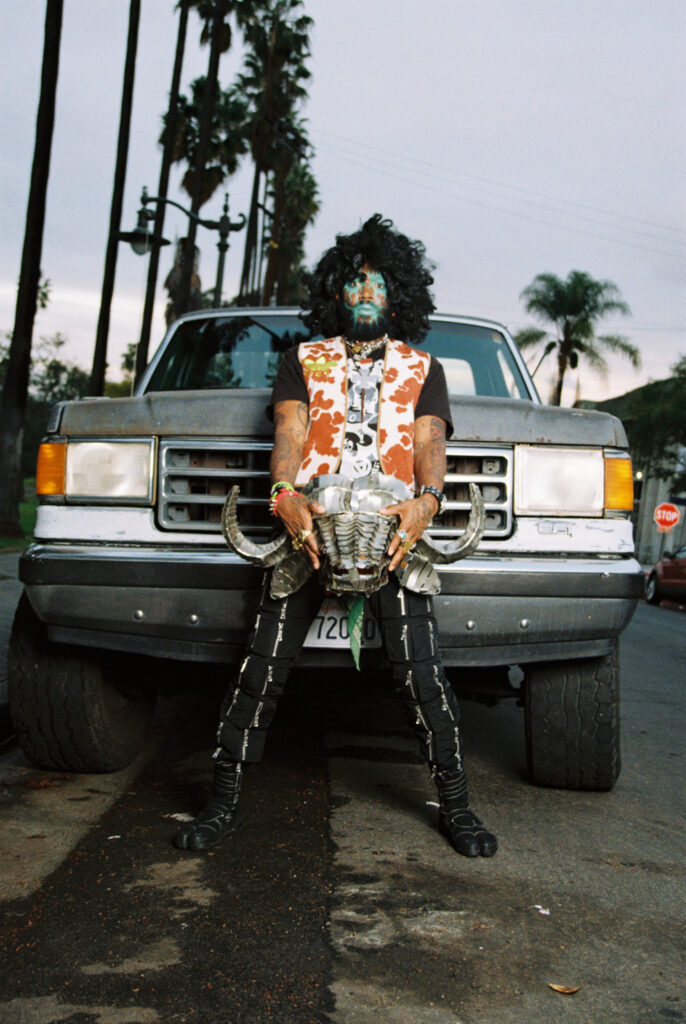
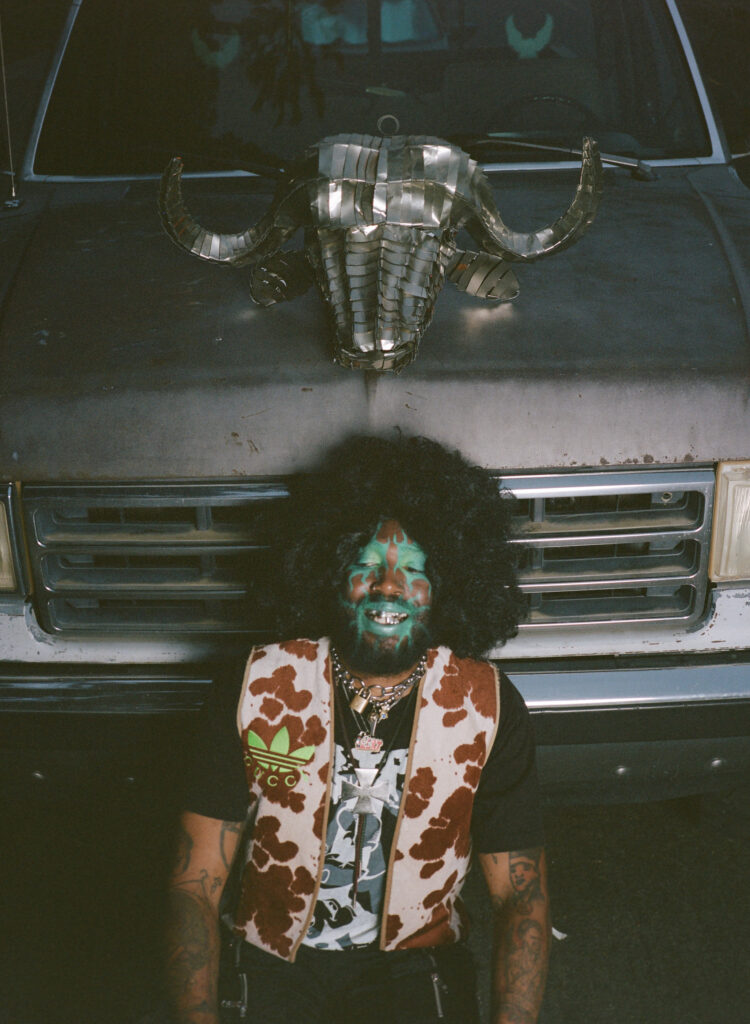
I got married six months into the pandemic. It was so life-changing because it happened at a time when I didn’t even know what being grounded felt like. It’s been amazing, basically having two of each other now. I hit the jackpot because my wife works just as hard as I do and she is very wise in so many areas of life I might not be as thoughtful in. She does most of my makeup and a lot of behind-the-scenes work for myself and our friends. It’s collaborative, but also an extension.
Lately she’s been directing videos and costuming for clients. On her last video shoot with our friend Alexis, you know what I did? I watched her child. I sat on the bench in a fairy fort and watched over a 4-year-old while everyone else had all the fun creating a full video production. But really, I felt like I had the fun, passing the time with this kid and making sure he was having a good time. It was beautiful. We also have the same admiration for animals, we have about 11 right now from doing rescues, fosters… D*mn animals keep showing up at the house. Three hairless sphinx cats, three bunnies, two chihuahuas, a turtle, two hairless Guinea pigs… Some opossums and a parakeet. <Haha> Isn’t that crazy? It’s some cosmic shit over there… The wife and the animals man, I wouldn’t change that sh*t for anything.
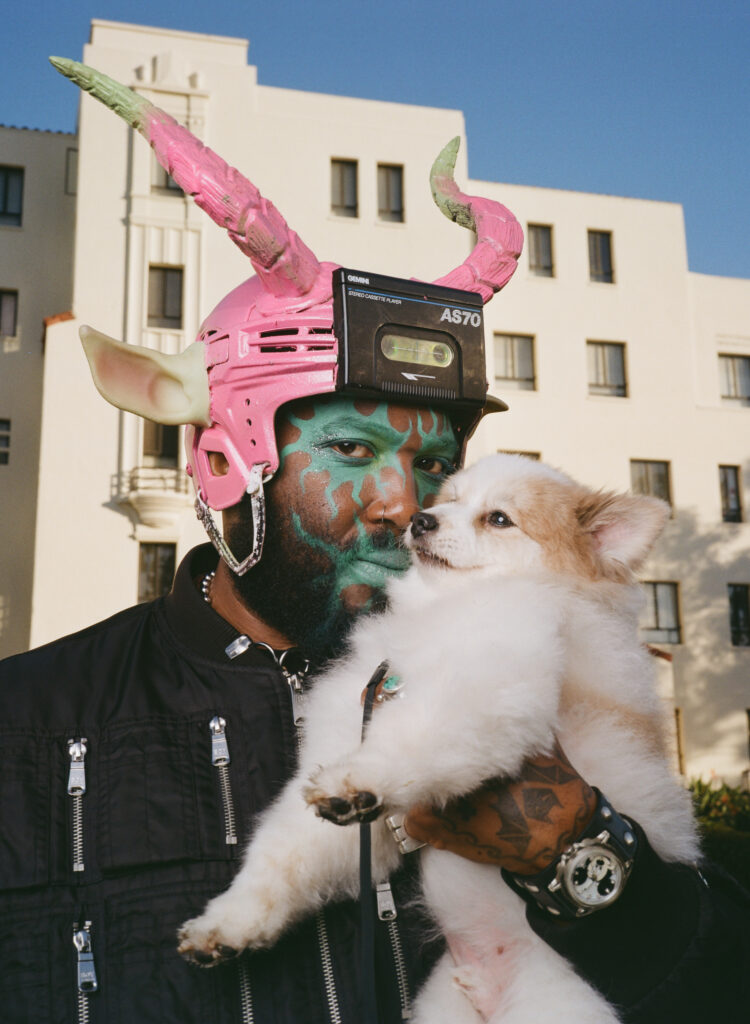
The concept for hockey around Shamon Cassette, and the reason I wore hockey gear on-stage at that first Surfbort show back, was about awareness – the right history of the sport, which was invented by black people in Canada. It’s kind of gated as an activity because people/children of color can’t afford the equipment, there’s so many pieces of gear you need just to be able to start.
I’d always been into roller hockey but around 2020 was when I really got into the ice side of things. I felt a purpose to dive into it and found this whole secret history that rarely gets broadcast. What ticked me was breaking into a box of hockey cards I had been saving and discovering there was not a single person of color in the whole f*cking pack.
I spent years putting the pieces together and started feeling like nobody wanted to listen to me, even though I had become an active, avid fan. So I started going down to the King’s games, bringing fans with me, to spread awareness on the game’s origins. The Kings realized what I was doing and eventually contacted me – so now I’m taking meetings with the LA Kings, but they’re not listening. And I’m going, Hey dude, I’m doing programs on my own because y’all ain’t with it. I was organizing donations, trying to get gear to kids, doing rooftop-renegade hockey rink community work during the pandemic. I started a whole f*cking league, just to get people interested, and it was working. People didn’t realize that hockey is that cool, that it really is the punk rock of sports. Going to a game is an experience you could never have by watching on TV.
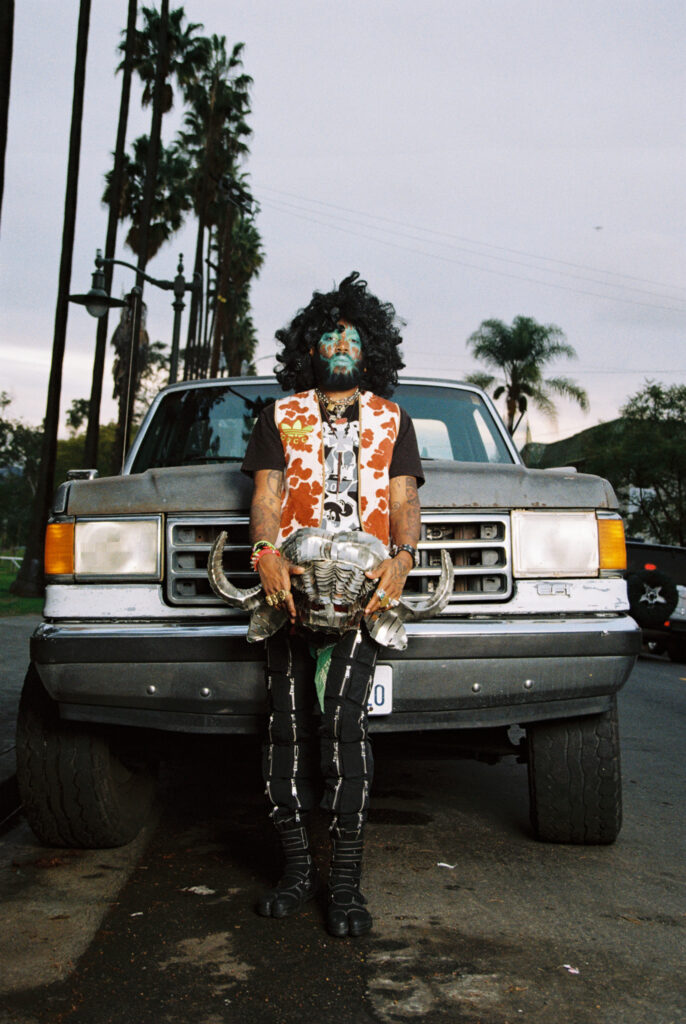
Hockey and its black history made my fashion go back full circle. I started designing hockey jerseys for myself and my band to wear during performances. I got into fashion to take a break from racial tension, and got pulled back into the art form to stand against what made me uncomfortable in the first place.
I live by spontaneity and Wabi-Sabi – that’s the Japanese philosophy of beautiful imperfection. The beauty is in the imperfection, so don’t overcook it. Once you feel like stepping back from a project, that’s your moment to say, Hey, Wabi-Sabi, all good. Spontaneity and Wabi-Sabi.

-SC.